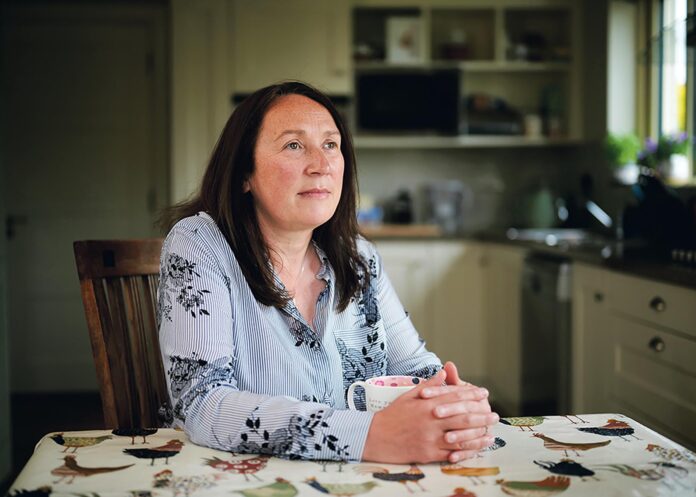A SURVIVOR of ovarian cancer has paid tribute to her late sister on what would have been her 50th birthday. Anne Murphy, a nurse from Tulla, is also urging other women to be aware of the symptoms, as World Ovarian Cancer Day is marked on Saturday.
While Anne’s cancer was found early, her sister Gráinne was at stage four when her condition was diagnosed. “Tragically, Gráinne passed away before her 42nd birthday,” said Anne.
“She had been attending various doctors for two years and when she was finally diagnosed, her cancer was terminal. Ovarian cancer presents with symptoms that are often put down to other conditions, from endometriosis to Irritable Bowel Syndrome (IBS). Gráinne had had a baby six months previously and she was told her symptoms were connected to pregnancy.”
Gráinne’s diagnosis was, in many ways, the catalyst for the detection of Anne’s own condition. “After Gráinne’s cancer was discovered, I went back to my own doctor and asked them to look again at tests that I’d had done,” she explained.
“We have the BRCA gene which raises the risk of ovarian and breast cancers. I was diagnosed with fallopian tube cancer, which is where ovarian cancer begins. Gráinne and I had some of our chemotherapy together at St James’s Hospital, but her prognosis, sadly, was very different to mine. She would have been 50 on April 29 and it’s a very fitting time to urge others to go their GP if they have concerns.”
As part of a major awareness-raising campaign involving Anne, Clare Cancer Support and The Irish Cancer Society, Áras Chontae an Chláir and Bunratty Castle are to light up in teal on Saturday.
“We want people to know the symptoms and to know that there is hope too,” said Anne. “I’m the proof of that.”
As a nurse, and part of the team at Clare Cancer Support, Anne is a passionate advocate for better education around women’s health.
“Based on Gráinne’s experience, the message is to raise any concerns with your GP,” said Anne. “There’s the acronym BEAT, which is based on a study of more than 10,000 women. If you have bloating, are eating less but feeling full more quickly; if you have abdominal pain and changes in toilet habits, and if these symptoms persist for three weeks for more, then you need to see your GP. Don’t be shy, be body aware.”
Anne noted that a lack of screening for ovarian cancer means that women’s own vigilance is the best way to keep track of any symptoms.
“There is no screening tool and cervical screening won’t detect ovarian cancer,” she explained. “The thing is, however, ovarian cancer is more common and leads to more deaths. Most women know about cervical cancer, but awareness of ovarian is a lot lower – that needs to change.
“We put up with a lot of pain, hassle and discomfort, but need to be aware of symptoms that could indicate a serious problem. The very positive thing is there are new treatments, particularly PARP inhibitors which are given in tablet form. They’re not chemotherapy and people can live well with the condition. Some have had complete remission.”
Saturday is a big day in more ways than one as Clare Cancer Support celebrates its eleventh birthday on Saturday. As part of Ovarian Cancer Awareness Day, Ennis woman Alisheen O’Connell, a member of Clare Cancer Support, is among those sharing her experience as part of a series of video messages. She said that women often experience symptoms which they tend to ignore.
“I had severe lower back pain that was different, so I went to my GP, and it snowballed from there,” Alisheen outlined. I had a radical hysterectomy and six rounds of chemo. That was very, very successful. That was 2017. I returned to work part-time in 2019. So, please listen to your body, it’s telling you the truth.”
Anne also believes that society and the medical profession need to listen to what women are telling them.
“If you look at how other countries educate girls and young women about their general health and their reproductive health, you see that Ireland still has a way to go,” she said.
“There’s a major social media campaign which we hope will also keep ovarian cancer in the minds of medical professionals and mean they are less likely to miss the symptoms. Of those who get ovarian cancer, 20% are under the age of 40 and we need women and medics to be more aware of the condition.”
According to the National Cancer Registry, ovarian cancer is the fourth leading cause of female cancer deaths in Ireland. Over 400 women are diagnosed annually with 290 women losing their lives due to the disease. Ireland ranks among the highest in the world in terms of mortality from ovarian cancer.
On Saturday, a free webinar on PARP inhibitor treatment takes place on Zoom with oncologist Dr Dearbhaile Collins (www.bit.ly/May8Parp). The event takes place in conjunction with the ovarian cancer community, Ovacare.ie.
Tulla woman’s appeal after late sister’s diagnosis delay

